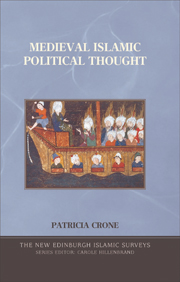Book contents
- Frontmatter
- Contents
- List of charts
- Preface
- Addenda and corrigenda
- I THE BEGINNINGS
- II THE WANING OF THE TRIBAL TRADITION, c. 700–900
- III COPING WITH A FRAGMENTED WORLD
- IV GOVERNMENT AND SOCIETY
- 17 THE NATURE OF GOVERNMENT
- 18 THE FUNCTIONS OF GOVERNMENT
- 19 VISIONS OF FREEDOM
- 20 THE SOCIAL ORDER
- 21 MUSLIMS AND NON-MUSLIMS
- 22 EPILOGUE: RELIGION, GOVERNMENT, AND SOCIETY REVISITED
- Charts
- Bibliography, abbreviations, and conventions
- Index and glossary
17 - THE NATURE OF GOVERNMENT
from IV - GOVERNMENT AND SOCIETY
Published online by Cambridge University Press: 05 August 2013
- Frontmatter
- Contents
- List of charts
- Preface
- Addenda and corrigenda
- I THE BEGINNINGS
- II THE WANING OF THE TRIBAL TRADITION, c. 700–900
- III COPING WITH A FRAGMENTED WORLD
- IV GOVERNMENT AND SOCIETY
- 17 THE NATURE OF GOVERNMENT
- 18 THE FUNCTIONS OF GOVERNMENT
- 19 VISIONS OF FREEDOM
- 20 THE SOCIAL ORDER
- 21 MUSLIMS AND NON-MUSLIMS
- 22 EPILOGUE: RELIGION, GOVERNMENT, AND SOCIETY REVISITED
- Charts
- Bibliography, abbreviations, and conventions
- Index and glossary
Summary
As seen in Chapter 1, early Muslims tacitly assumed humans to have originated in a politically organized society based on revealed law, and to have recreated such a society whenever God sent them a messenger with a new law. In the ninth century they began to enquire into their own presuppositions. Why do humans live social lives? Must their societies be based on religious law brought by a prophet or might man-made law and morality suffice? Could one manage without a monarch? Must government be monarchic, or indeed autocratic, or could alternative forms of political organization be envisaged? Their answers mostly, though not always, endorsed the assumptions with which they had started out, but they did so with a plethora of explicit argumentation which often raised new questions and which continued beyond the period considered in this book. The debate was dominated by philosophers, mutakallims, and Shīite thinkers rather than by religious scholars from the Sunni camp, but the latter accepted many of the ideas it produced. Since the arguments are scattered in works of the most diverse genres and the study of them is still in its infancy, what follows is merely a preliminary survey.
Why do humans live in societies?
Most educated persons in the Near East before the rise of Islam knew the answer to this question, ultimately from Aristotle and other Greek philosophers.
- Type
- Chapter
- Information
- Medieval Islamic Political Thought , pp. 259 - 285Publisher: Edinburgh University PressPrint publication year: 2004



